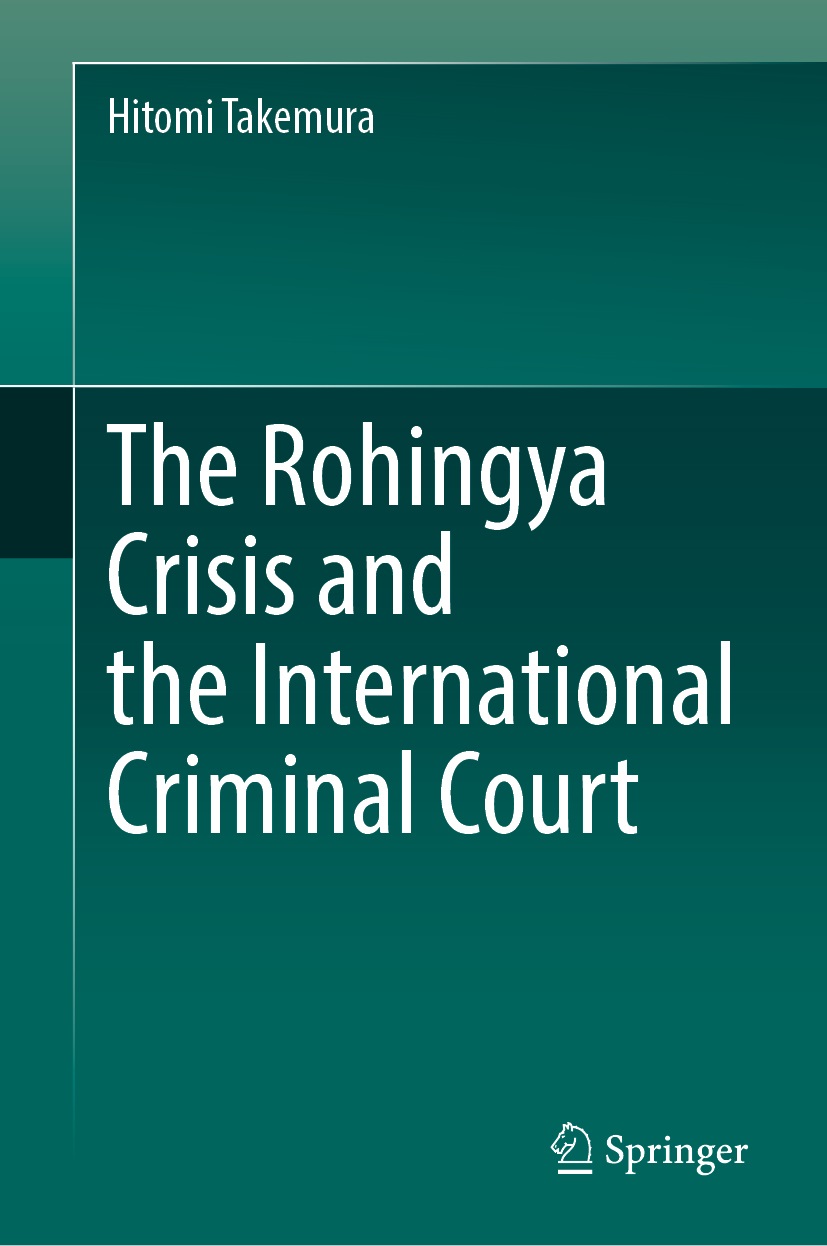Other Publications
The Rohingya Crisis and the International Criminal Court
AbstractOn May 31, 2023, Springer published a book by Professor Hitomi Takemura, Professor at the Graduate School of Law. The book, titled The Rohingya Crisis and the International Criminal Court, analyzes the International Criminal Court (ICC) and its relationship with the Rohingya crisis. The book highlights the contemporary challenges faced by the ICC, focusing on its connection to the Rohingya issue. The complex relationship between the Rohingya crisis and the ICC involves various challenges, including the relationship between non-State Parties and high-ranking government officials. Professor Takemura addresses this relationship through a literature review, providing up-to-date information. She also develops her argument by explaining the history of the Rohingya crisis. Moreover, she examines the Gambia v. Myanmar case at the International Court of Justice (ICJ) and its connection to the ICC progress. Lastly, she provides a final assessment of the ICC's legitimacy, effectiveness, and efficiency.
Conditionality Rules and the Rule of Law for Safeguarding the EU Budget [in Japanese]
AbstractIn April 2023, the Review of European Law published a paper authored by Professor Yumiko Nakanishi at the Graduate School of Law, Hitotsubashi University, titled "The Principle of The Primacy of EU Law and the Right to Request Preliminary Rulings from Domestic Courts." The paper discusses the ruling of the European Court of Justice (ECJ) regarding Poland's challenge to the annulment of the conditionality rules. The rules regarding the EU Recovery plan raised concerns about the mechanism assuming respect for the rule of law. Professor Nakanishi analyzes the judgment as the second chamber ruling establishing a mechanism obligating compliance with the rule of law. She also confirms that this measure is in line with EU law. The ECJ explains that Article 2 of the EU Treaty covers the principle of the rule of law and it relies on it as a legal reasoning. The ECJ also emphasizes the need for measures to protect its value in various situations, stating that EU member states should uphold this value. Professor Nakanishi says this case is significant, revealing the EU's identity for the first time in the judicial field. She also notes that this ruling is essential for developing EU law, facilitating judicial decisions to reaffirm the rule of law.
Integration of the Emerging Countries: A Double-Edged Sword [in Japanese]
AbstractOn May 22, 2023, Asahi Shimbun published an article based on an interview with Professor Maiko Ichihara at the Graduate School of Law, titled "Integration of the Emerging Countries: A Double-Edged Sword.” This article discusses the importance of cooperation with emerging and developing countries known as the "Global South" in the G7 Summit. Professor Ichihara evaluated that while the setting of practical and collaborative agendas as a demonstration of consideration for these nations, the G7's approach appeared to forcibly incorporate the Global South into the "West." The processor noted that this approach has garnered mixed opinions and has the potential to provoke backlash. Additionally, Japan's involvement may have led to an increased perception of Japan as part of the West, and Japan needs to delicately manage its relations with the Global South more than ever.
Micro-evidence for Peacebuilding Theories and Policies
AbstractOn November 30, 2022, Springer published the book Micro-evidence for Peacebuilding Theories and Policies, co-authored by Professor Kazuhiro Obayashi at the Graduate School of Law, Hitotsubashi University. In this book, multiple researchers provide insights into theories and policies of post-conflict peacebuilding. The analysis is based on micro-level evidence, considering civil norms and values. Professor Obayashi and his co-authors’ chapter studies the relationship between violence during war, risk and time preferences, and participation in sociopolitical organizations in the northwestern region of Pakistan. His findings reveal that war-related violence increases victims' risk-averseness, influencing their social activities. However, local organizations function as safety nets, mitigating the impact of violence.
The European Green Deal and the Recovery of the EU Economy [in Japanese]
AbstractOn February 28, 2023, Bunshindo Publishing Corporation published a book co-authored by Professor Yumiko Nakanishi of the Graduate School of Law, Hitotsubashi University, titled The European Green Deal and the Recovery of the EU Economy. The European Green Deal has gained attention within the EU as a sustainable governance initiative, and the book provides an overview of the initiative and its underlying structure. In Chapter 2, titled "Legal Foundations of the European Green Deal," Professor Nakanishi examines the European Green Deal through the lens of European Climate Law. Professor Nakanishi evaluates European Climate Law positively, stating that it was "adopted in the form of the most rigorous and unified rules." Further, she explains that three measures are necessary for its implementation: (1) binding target setting, (2) phased target setting with specific deadlines, and (3) stipulation of efforts to achieve the goals through progress assessment. Lastly, she points out the need for fundamental change in the current situation since it does not recognize natural rights.
The Hiroshima G7 Summit and Nuclear Disarmament: Essential talks were held, but more is now needed
AbstractOn May 23, 2023, The Diplomat published an article authored by Professor Nobumasa Akiyama, Dean of the School of International and Public Policy, Professor at the Graduate School of Law, and a GGR Researcher, titled “The Hiroshima G7 Summit and Nuclear Disarmament: Essential talks were held, but more is now needed.“ Professor Akiyama discusses the position of the G-7 Leaders’ Hiroshima Vision for Nuclear Disarmament" presented at the G7 Hiroshima Summit and the significance of the G7 leaders standing in the A-bombed city. Professor Akiyama evaluated the significance of holding the summit in Hiroshima, given that Prime Minister Kishida has made nuclear disarmament his life work. The professor also noted that the "Hiroshima Vision" puts nuclear disarmament at the forefront even amidst the difficult international environment and that it not only conforms to existing frameworks but also sets out new initiatives regarding transparency, for instance. Finally, the professor emphasized the role of the G7 in global governance and a world without nuclear weapons and said that the international community should use this summit as a springboard to implement more substantial measures.
Hiroshima Vision for G7 Nuclear Disarmament: Respect for Dialogue among Different Stance – Nobumasa Akiyama, Professor, Hitotsubashi University [in Japanese]
AbstractOn May 21, 2023, Tokyo Shimbun introduced an article that interviewed Professor Nobumasa Akiyama, Dean of School of International and Public Policy, Professor at Graduate School of Law, and GGR Researcher, titled “Hiroshima Vision for G7 Nuclear Disarmament: Respect for Dialogue among Different Stance - Nobumasa Akiyama, Professor, Hitotsubashi University.“ The article outlines the discussions on nuclear disarmament at the G7 Hiroshima Summit. Professor Akiyama explains that it is important that not only the seven G7 states, but also invited states and international organizations jointly demonstrate their stance on nuclear disarmament. The professor also pointed out the significance of G7 leaders acknowledging the reality of nuclear exposure amid the current security environment. Finally, the professor said that the Leaders' Statement and the Hiroshima Vision confirmed the adherence to Treaty on the Non-Proliferation of Nuclear Weapons regime, and argued that, while further cooperative measures are required, respecting the forum for dialogue among countries with different positions is the way to approach a world without nuclear weapons.
Chinese Technology, Opportunity or Crisis? [in Spanish]
AbstractOn May 13, 2023, GGR assistant and Chilean international analyst Sascha Hannig Nuñez published an article titled “Chinese Technology, Opportunity or Crisis?(in Spanish)” in the Argentine daily La Nacion. Referring to examples from other regions, Hannig Nuñez discussed the collaboration between countries in the Latin American region and Chinese tech corporations. First, it was noted that one of the distinguishing characteristics of Chinese companies is that they are obligated to provide the Chinese Communist Party(CCP)with the information they collect, whether it was collected inside or outside of China. She explained that doubts about the information security aspect have led to a series of cases in which Huawei and ZTE have been banned from national networks by a number of countries such as Australia, the United States, the United Kingdom, and Japan. On the other hand, she argued that discussions on which country’s products should be introduced are ongoing in the Latin American region. Given that Chinese companies have strength in price and service and that the CCP has grown its influence in the region, the possibility of cooperation between Chinese companies and regional governments is not insignificant. She emphasized the need for discussions at the regional framework level, pointing out that decisions associated with the entry of Chinese tech companies made in a single country affect the entire region.
World Without Nuclear Weapons, However Long It May Take: Expectations of Japanese Researcher for the Hiroshima Summit [in Japanese]
AbstractOn May 18, 2023, Asahi Shimbun introduced an article that interviewed Professor Nobumasa Akiyama, Dean of School of International and Public Policy, Professor at Graduate School of Law, and GGR Researcher, titled “World Without Nuclear Weapons, However Long It May Take: Expectations of Japanese Researcher for the Hiroshima Summit.“ In this article, Professor Akiyama discussed what the G7 should voice toward "a world without nuclear weapons.” First, Professor Akiyama argued that, based on rising tensions among the major powers and in the region, there will probably be virtually no linear progress toward “a world without nuclear weapons.” The professor then stated that building a track record of nuclear weapons not being ultimately used under any circumstances is important for achieving “a world without nuclear weapons,” even though it may seem like a slow and roundabout way to go. The professor stressed the importance of bridging the gap in perceptions of nuclear weapons due to the different geopolitical risks that countries face to strengthen cooperation between emerging and developing countries in the nuclear field. In addition, regarding China's nuclear weapons, the professor explained that the lack of disclosure of nuclear-related information has created a major transparency problem.
Dystopia: Hybrids of Reality [in Spanish]
AbstractOn March 20, 2023, Sascha Hannig Nuñez, GGR assistant and international analyst published an article "Dystopia: Hybrids of Reality (original title: Distopías híbridas de realidad)" in the Spanish literature critic journal, Cuadernos Hispanoamericanos. Hannig Nunez discusses the concept of dystopia, referring to philosophical, political and literary sources, as a starting point for her discussion of dystopia, which crosses boundaries such as study fields, eras, and geography. First, Ms. Hannig Nunez finds commonalities with T. More's concept of utopia and dystopia’s ideological origin as coined by J. S. Mill. She also argues that the experience of control in authoritarian regimes has been reflected in dystopian works, and finds this characteristic from Y. Zamyatin under the Soviet Union to J. Baradit's in the current Chile, South America. Ms. Hannig Nunez points out that technological developments have also developed means of repression, as reflected, for example, in the literature of Kazuo Ishiguro, which incorporates cloning technology. Finally, she noted that parallels to an Orwellian world can be seen in today's reality, and warned that the banal use of the word dystopia to describe mundane situations can lead to the loss of its striking and daring meaning.



